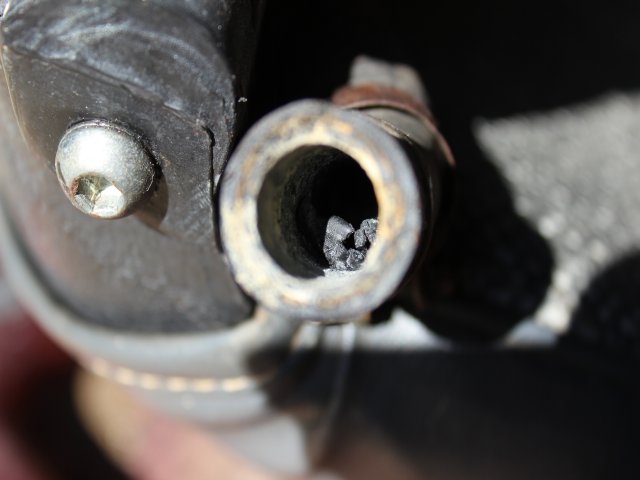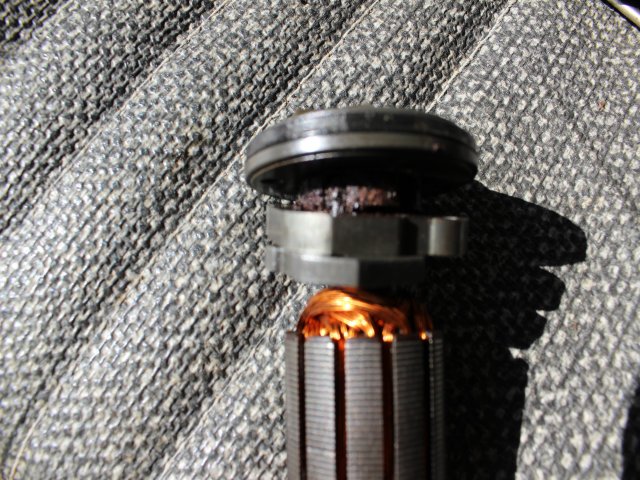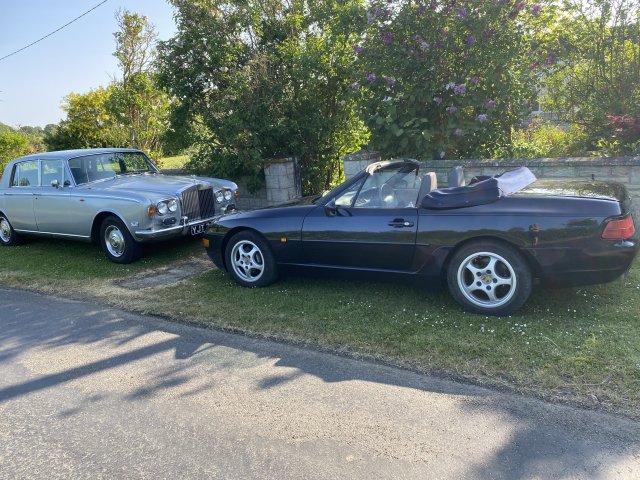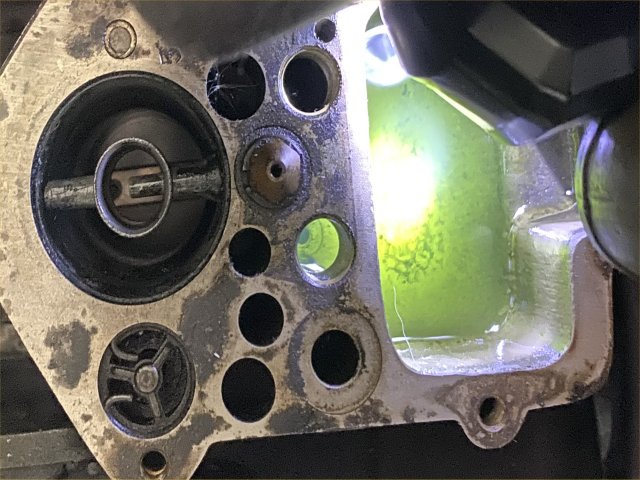| Author | Message | ||
Patrick Lockyer. Grand Master Username: pat_lockyer Post Number: 2572 Registered: 09-2004 |
One of my Porsche's would have the problem of fuel Starvation Ie pump would run giving no fuel or pressure, first check was the tank filter all ok then a check to fuel flow from filter nothing when pump running. Remove fuel hose to pump and fuel a plenty reconnect - still nothing. Remove hose and find this build up inside.  The pump would run for the cycled time and the hose would also partly collapse. Time to see inside the pump with build up of petrol residue and rubber stopping all flow! .  This modern petrol beware. Still have to check injectors and fuel valves. . | ||
Brian Vogel Grand Master Username: guyslp Post Number: 3331 Registered: 06-2009 |
Older vehicles simply must be retrofitted with hoses and seals that are compatible with modern petrol. The vast majority have zero problems with it, and I can include my 2 SY2 era cars in that group. But if you go far enough back, that won't be the case. Ethanol in on-road vehicle fuel has been common since I was a teenager, way back in the 1970s, in the USA. I haven't encountered a car produced since then, anywhere in the world, that was intended to be marketed in the USA, that doesn't do just fine with E10. I don't get the "modern petrol beware" thing in 2023 because any vehicle in regular use should have been retrofitted, if necessary, a very long time ago. If it hasn't, then it is a "ticking time bomb" for exactly this sort of thing. Brian | ||
David Gore Moderator Username: david_gore Post Number: 4197 Registered: 04-2003 |
Brian, E10 fuel didn't become widespread in Australia until 2005. Locally produced cars from the mid-1990's were fitted with E10 compatible fuel systems and imported cars usually complied with fuel supplied in their country of manufacture/assembly. | ||
Brian Vogel Grand Master Username: guyslp Post Number: 3332 Registered: 06-2009 |
David, I do understand that the widespread introduction of E10 varies by country/region. But even if it was 2005 in Australia, that's 18 years ago. We all know that there exist fuel system components that were not ethanol resistant. But I find it hard to believe that anyone that is using a vehicle frequently has gone almost 2 decades with out replacing these components. I've just grown tired of the "demon ethanol" schtick long past the time it should have died the death it deserves, just like the "demon unleaded" died the death it deserved. The phrase, "Get over it and do what needs doing!," springs immediately to mind. It's long past time to have gotten over this - it's a fact of life, and has been for a very long time. Brian | ||
Trevor Hodgekinson Frequent User Username: wm20 Post Number: 294 Registered: 11-2006 |
Petrol has not existed for the past 30 years except in the few countries that have a legal definition of what petrol has to be . In Australia it is light fuel oil mixed with whatever waste product volatile solvents that can be bought for a song then add some aromatics so there is something that can start burning at room temperature . Unfortunately these solvents attack a very wide variety of rubbers & plastics commonly used for "fuel" ( which is not petrol ) lines . Then to complicate even further new zero permebility fuel line regulations forced most fuel lines to become multilayer construction which is highly prone to separation if not connected using a lubricant on push over connectors . The new compounds do not last very long and suffer badly from both UV and heat so require regular replacement. Thus again EPA regulations have made a problem that was so minute to be almost non existent into a substantially larger source of pollution as no one has the vapour capture & fuel disposal equipment needed to remove & replace these lines pollution free . It has also quadrupled the cost of fuel lines and shortened their shelf life forcing techs like me to order is expensive 10' rolls in place of cheaper 100' rolls + extra transport + extra packaging etc etc etc . | ||
Patrick Lockyer. Grand Master Username: pat_lockyer Post Number: 2573 Registered: 09-2004 |
Well John Ah Brian I see that your articulate write up has the slipped in note that the classics (used frequently) something that most classic’s and the like we all know most are laid up in the winter months just like the motor mowers etc. FYI and to bring you up to date it is not only components that fail with this horrid petrol it can cause gumming up of metals etc. Retro fitting of parts will not be a end of your E5 E10 problems BEWARE! Be very careful about giving the wrong tone of advice on this fuel otherwise folk will have all sorts of fueling problems. | ||
John Rowney Experienced User Username: johnrowney Post Number: 144 Registered: 02-2015 |
Trevor. This is my first every post on this forum ever to argue with someone. Hopefully it will be my last. Please do not talk about things you obviously do not know about. In all my posts in this forum, I have sought answers to my problems and have tried to let people know of things I have found in my various amateur way of trying to fix Rolls-Royce and Bentley cars which I have thought might be of some interest to others. My background to repute your claims, Trevor, is that after 10 years involvement in government, university and private company research, I worked for Amoco/BP in Australia and overseas for 24 years mainly in oil refineries as a chemical engineer. Amongst other responsibilities, at various stages, I was involved in the design and redesign of various plants, oversaw technical aspects of refining, planned the refinery operations and optimisation, had fuel marketing chemists working under me, and managed and supervised the long-term and short-term operations of these complex processes. I reckon I might have a little background to state that petrol in Australia is not light fuel oil mixed with waste product volatile solvents and some aromatics. Before you sprout off about things you don't know about, why not google petrol and find out what it is? Petrol in Australia is normally a blend of many components emanating from many types of crude oil. Some components are taken directly from the initial distillation of crude oil, and the other components are crude oil parts which go through various reactions and treatments of various types to improve their properties for blending into fuels including petrol, jet fuel, diesel and other products. The management and planning of producing fuels in an oil refinery is a complex and challenging process. It is not the simplified rubbish that you espouse. | ||
David Gore Moderator Username: david_gore Post Number: 4199 Registered: 04-2003 |
Hi John, My second son works at the Ampol Lytton refinery in Brisbane in the catalytic cracker unit having started with Caltex at Kurnell and was then offered his current position as one of a small number of Kurnell employees offered key positions at Lytton when Kurnell was shut down. From our past discussions at various times, I can confirm your comment "Petrol in Australia is normally a blend of many components emanating from many types of crude oil. Some components are taken directly from the initial distillation of crude oil, and the other components are crude oil parts which go through various reactions and treatments of various types to improve their properties for blending into fuels including petrol, jet fuel, diesel and other products." The situation with processing of reclaimed oils may be different and I cannot comment in this regard. . | ||
Brian Vogel Grand Master Username: guyslp Post Number: 3333 Registered: 06-2009 |
@David and John, Indeed, this is characteristic of the blending of fuels the world over. I tire of the idea that "petrol was better" at unspecified points in the past. Yes, formulations have been tweaked over time, and for good reasons. But I have yet to see a vehicle "taken down" by the fuels available today, even if they were made many decades ago. And, when it comes right down to it, and like so many other things besides fuel, you have what's commercially available and you use it. If you need to make some tweaks to your vehicle to accommodate it, that's what you do. I've been using E10, and pretty much only E10, literally for over half of my life now in automobiles, mowers, etc., without a single problem. And that includes putting the mower away with gas in the tank in the fall and firing it up again in the spring when the next mowing season commences. Same for the string trimmer. Now I am in the process of slowly replacing the lawn maintenance equipment with battery-powered electric equivalents. Just got a brand-spankin' new 80V mower a couple of weeks ago, and passed along my still fully functional, and somewhere around 20-ish years old, gasoline-powered mower to someone else who wanted it. Brian | ||
John Rowney Experienced User Username: johnrowney Post Number: 146 Registered: 02-2015 |
David and Brian. I have some comments to expound on things related to petrol. Basically, petrol is produced to meet specifications required by governments and by the companies making them. Nowhere is there a requirement that specifies what petrol actually is composed of. The specifications define the properties of the particular fuel. The specs vary depending on the type of petrol eg E10, E5, 91 Octane, 95 Octane etc in Australia. There are also rigid specifications for oil refinery products from LPG through to bitumen. If you could make petrol out of goat’s milk and meet the specifications that would be OK (but seemingly impossible). Only crude oil, shale oil, other synthetic crudes made from coal (like that produced in South Africa) or similar materials usually end up producing petrol. Some additives such as ethanol may be added, however these additives do have problems that are highlighted in this forum, but they can meet fuel specifications. Jet and diesel fuel made from biological materials are another matter. Generally, ethanol is not added to petrol in an oil refinery, but at the marketing terminals. This is because petrol is normally kept in floating roof tanks which have a water level in the bottom of the tank. Since ethanol absorbs water, fixed roof tanks are required to eliminate water, and the marketing terminals are best set up for this. David, I am pleased to hear your son is working on the cat cracker at Ampol at the Brisbane refinery. This brings back wonderful memories of my life boiling oil at the now demolished BP refinery across the river from the Ampol refinery, including a period where I was the cat cracker superintendent. As far as waste oils go, most refineries couldn’t be bothered with the logistics of accepting them in as feedstock because the volume would be minimal and not worth the effort. However, sometimes we would get some wastes from ships and elsewhere. We also had off-specification material that we created ourselves on startups or when changing crude types which we called “slops”. Typically, these off-spec materials would go into our crude tanks where they would comprise a small percentage of the oil fed to the refinery. These heavy parts of these materials would mainly end up as fuel oil. Most waste oil these days is probably burnt in furnaces like cement kilns. An expert like Mark Herbstreit would probably be able to give a more accurate picture of where waste oil ends up. I have to say that working in an oil refinery was the most rewarding and interesting career that anyone could have had, whether you were an operator, engineer, chemist, maintenance person, or had any of the other positions. It is a pity that only two oil refineries are left in Australia. We need refineries to keep the petrol supplies going to ensure that our Rolls-Royces and Bentleys keep on the road! Relying on overseas refineries for our fuel supplies is fraught with danger, but governments don’t seem concerned. . | ||
Patrick Lockyer. Grand Master Username: pat_lockyer Post Number: 2574 Registered: 09-2004 |
This horrid petrol, car up and running again after its six month rest. First the blending of this petrol sounds as John has said very complex and challenging process at the time. IMO something that works as produced at the time but the problems of corrosion after time are now showing, more so with mowers etc as Trevor has stated in the past. IT is now proved that ethanol corrodes within different metals, this was proved by the testing of the rotary pump working but not producing any flow! Hoses plastics etc are also failing if not changed. Another point was the instant starting up of the engine with the new fitted pump but only on three cylinders. Thank goodness for the working balancing shaft. Testing the rail pressure all ok, test injector for flow nothing, in all my years from the late sixties working with the Lucas electric injection systems on the Triumph's NOT mechanical I have only had failed electrics within the injectors causing a fault. This one the electric type solenoid was trying to open so confirmed stuck, a small trick was needed and was soon working under test. Corrosion with oxidation within the unit being the cause IMO. Refitted and the old girl is running again. Has me thinking the workshop manuals were wrote long before this crap fuel was produced, testing for ethanol faults within the fuel system is a new ball game. Folk need to be careful what they preach from the manuals with the KE2- Jetronic – K-Motronic Pittsburgh pumps etc could end up costing owners thousands with fueling issues. BTW use genuine parts!  The Shadow has company!  Phase separation another ball game! Pix of the start of the process from a Weber carb from a past Ethanol caused failure.  . | ||
Mark Aldridge Frequent User Username: mark_aldridge Post Number: 846 Registered: 10-2008 |
Brian, there must be a USA/UK difference, maybe temperature , climate or formulation. The UK motoring press has endless complaints of loss of power , higher fuel consumption with E10 fuel on newer cars. On classics, E5 is still causing cork gasket failures ( Autovacs and SU H type carbs), fuel leaks and degrading rubber fuel hoses. I am having to change fuel pipes in engine bays at 3 years now, previously 30 years !.Have just cleaned up a HIF carb with flooding issues, and I have a mower with a corroded carb, about to go to the tip. Are mogas and avgas aircraft allowed to use E10 fuel in the USA ?I use an octane booster/ ethanol protectant/ valve seat lubricant in all of my cars( usually Tetraboost or Miller VSPe ) | ||
Brian Vogel Grand Master Username: guyslp Post Number: 3334 Registered: 06-2009 |
Mark, Then there must be. I've been running both of my SY2 cars on E10 every moment I've owned them. And I do not use nor believe in additives. Aviation fuel cannot contain ethanol due to issues with phase separation (which is well-nigh impossible in motor vehicles, see this article from the US EPA, firmly based in data: Water Phase Separation in Oxygenated Gasoline) and freezing at altitude as well. I'm not sure what you mean by "mogas." For a very long time marine fuel could not contain ethanol, either, but that has changed in recent years. The fuel tank sealants on older boats were not ethanol resistant, but the tanks on more recently built ones have ethanol resistant components. All any one of us can do is write about what applies to us where we live. And I presume that's what most people are doing. But some of the claims made, regardless of venue, have absolutely nothing to do with ethanol if you've bothered to do extensive research on ethanol as a fuel additive. It's almost certain to be the result of some other factor related to the fuel. Brian P.S. My personal collection of select research material I've archived over the years can be found on my Google Drive in a folder called Ethanol Related. The sources are not "fly by night" and what they say based on years of data is echoed by my own anecdotal experience. | ||
David Gore Moderator Username: david_gore Post Number: 4200 Registered: 04-2003 |
Further to Brian's post above, the additional files mrntioned are directly accessible by clicking on the "Ethanol Related" link in the above post. | ||
Patrick Lockyer. Grand Master Username: pat_lockyer Post Number: 2575 Registered: 09-2004 |
Busy times atm but car ran well to the Porsche event on V power, still will need to empty fuel system when car not in use. chatting to owners and yes confirmed here in the UK real probs with the fueling since Ethanol introduction. The same will and has occurred with RR cars. Three generations with myself taking the pic of the 968. BTW a large 968 following in the USA!  |